Lessons from reforms in Central and Eastern Europe in the wake of the global financial crisis
"The response of the ten new eastern members of the European Union to the global financial crisis has valuable lessons of crisis resolution for the euro area. These countries were severely hit by the crisis in the fall of 2008 and responded with extensive reforms. Crisis made the unthinkable po...
| Main Author: | |
|---|---|
| Institution: | ETUI-European Trade Union Institute |
| Format: | TEXT |
| Language: | English |
| Published: |
Washington, DC
2012
Peterson Institute |
| Subjects: | |
| Online Access: | https://www.labourline.org/KENTIKA-19134610124919528929-Lessons-from-reforms-in-Centra.htm |
| Summary: | "The response of the ten new eastern members of the European Union to the global financial crisis has valuable lessons of crisis resolution for the euro area. These countries were severely hit by the crisis in the fall of 2008 and responded with extensive reforms. Crisis made the unthinkable possible. Åslund outlines the main reform measures that the ten Central and East European (CEE) countries carried out, the most radical of which were substantial public expenditure and wage cuts. He then quantifies to what extent the CEE countries resolved the macroeconomic crisis and explores the effects of the reforms on future growth prospects. The fourth and major section discusses how the political economy of the crisis resolution actually worked. Finally, he examines what lessons euro area countries, in particular the South Europeans, can learn from the crisis resolution in the CEE countries. The apparent big structural problems for Italy, for example, are too much state bureaucracy, too much corruption, too regulated markets, and too high taxes and public expenditures. All these problems are possible to sort out, affirms Åslund; many of the newest members of the European Union have done so." |
|---|---|
| Physical Description: | 25 p. Digital |

